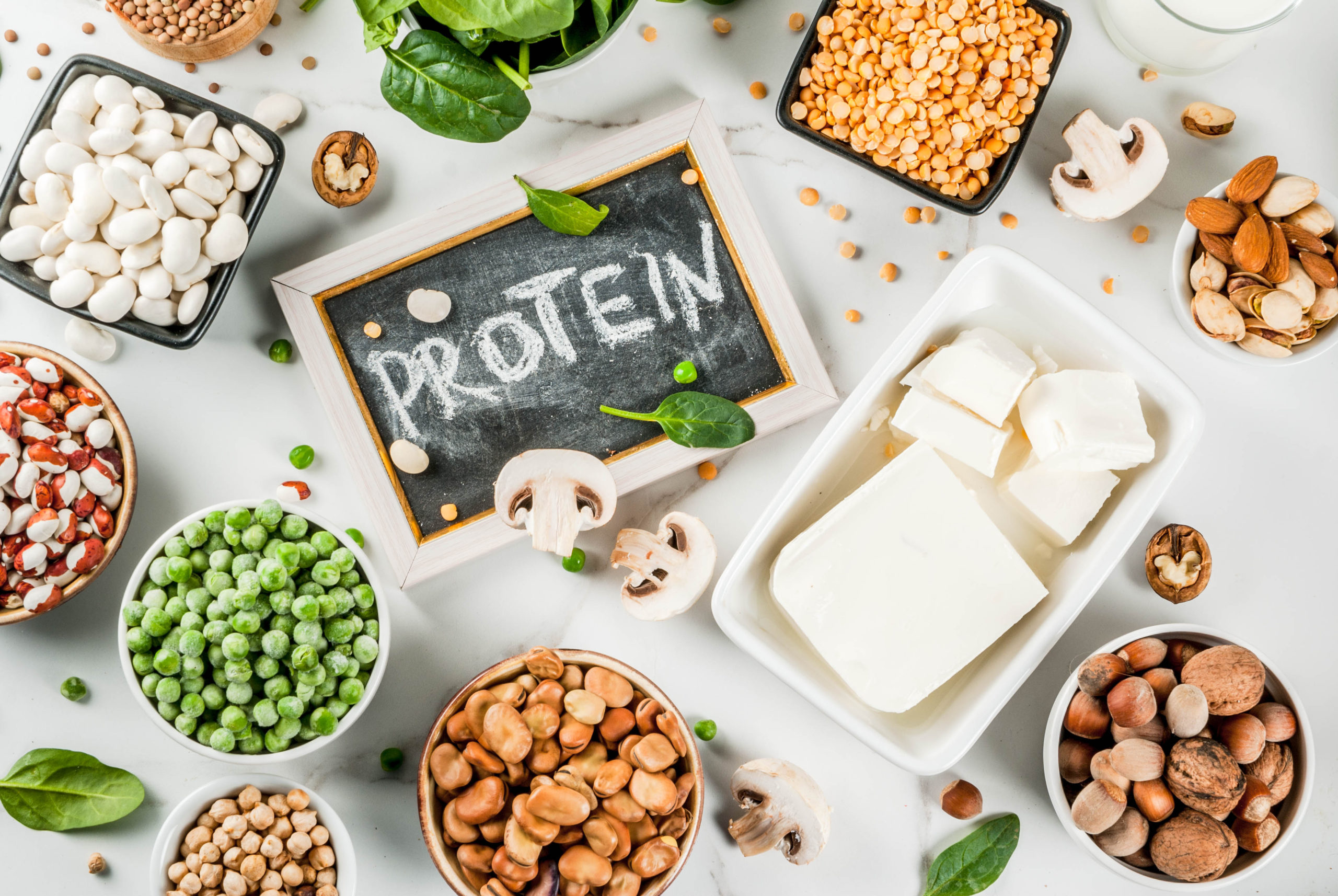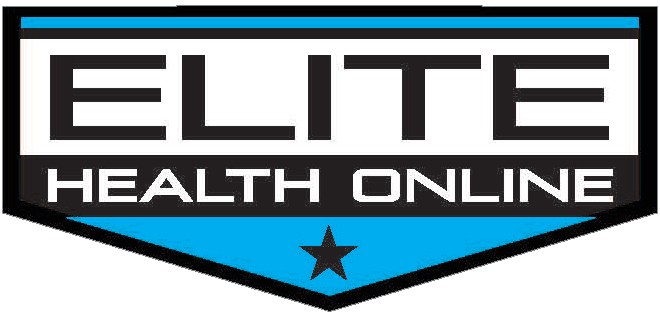
Are YOU getting enough?
Your body needs protein to stay healthy and work the way it should. More than 10,000 types are found in everything from your organs to your muscles and tissues to your bones, skin, and hair.
Protein is also a critical part of the processes that fuel your energy and carry oxygen throughout your body in your blood. It also helps make antibodies that fight off infections and illnesses and helps keep cells healthy and create new ones.
How Much Protein Do You Need? Webmd can tell us…
Not getting enough protein in your diet can lead to health issues. For example, tissue can break down and lead to muscle loss.
But more isn’t necessarily better. While it can help build muscle, if you take in too much your body may store the excess as fat.
The Dietary Guidelines for Americans, put together by the U.S. Department of Agriculture and the U.S. Department of Health and Human Services, recommend the following daily amounts of protein for different age groups:
- Children under 4: 13 grams
- Children ages 4 to 8: 19 grams
- Children ages 9 to 13: 34 grams
- Women and girls ages 14 and over: 46 grams
- Boys ages 14 to 18: 52 grams
- Men ages 19 and over: 56 grams
Simply put, most everyone should get 10% to 35% of their calories each day in the form of protein. You need more calories for activities like biking, lifting weights, or running, but the percentage of protein remains in the same range.
After age 40, you can start to lose muscle mass, a condition known as sarcopenia, and you may need more protein.
What Are the Best Sources of Protein?
High-quality sources of protein include:
- Fish
- Poultry
- Lean beef or pork (in limited amounts)
- Tofu
- Eggs
- Dairy products
But you can get all the protein you need from plant-based sources. These include:
- Nuts
- Seeds
- Legumes, like beans, peas, or lentils
- Grains, like wheat, rice, or corn
You can combine large amounts of these with smaller portions of animal-based sources, like dairy products or eggs to make sure you’re getting enough amino acids.
Limit the amount of protein you get from processed meats — like bacon, sausage, or cold cuts.
How Do High-Protein Diets Affect You?
Some weight-loss programs, like the Atkins Diet and the Ketogenic Diet, call for high amounts of protein and fat while limiting carbs. But research shows that they seem to primarily work well only in the short-term. One reason may be that people aren’t able to stick with this type of eating plan over a long period of time.
Be mindful of what diets you try. Focusing just on protein and fat can keep you from getting all the nutrients you need, and that can lead to unhealthy side effects. That can lead to fatigue, dizziness, headaches, bad breath and constipation.
10 Science-Backed Reasons to Eat More Protein
The health effects of fat and carbs are controversial. However, almost everyone agrees that protein is important.
Most people eat enough protein to prevent deficiency, but some individuals would do better with a much higher protein intake.
Numerous studies suggest that a high-protein diet has major benefits for weight loss and metabolic rates.
Here are 10 science-based reasons to eat more protein.
Share on Pinterest
The three macronutrients — fats, carbs, and protein — affect your body in different ways.
Studies show that protein is by far the most filling. It helps you feel more full — with less food.
This is partly because protein reduces your level of the hunger hormone ghrelin. It also boosts the levels of peptide YY, a hormone that makes you feel full.
These effects on appetite can be powerful. In one study, increasing protein intake from 15% to 30% of calories made overweight women eat 441 fewer calories each day without intentionally restricting anything.
If you need to lose weight or belly fat, consider replacing some of your carbs and fats with protein. It can be as simple as making your potato or rice serving smaller while adding a few extra bites of meat or fish.
Protein is the building block of your muscles.
Therefore, eating adequate amounts of protein helps you maintain your muscle mass and promotes muscle growth when you do strength training.
Numerous studies show that eating plenty of protein can help increase muscle mass and strength.
If you’re physically active, lifting weights, or trying to gain muscle, you need to make sure you’re getting enough protein.
Keeping protein intake high can also help prevent muscle loss during weight loss.
An ongoing myth perpetuates the idea that protein — mainly animal protein — is bad for your bones.
This is based on the idea that protein increases acid load in the body, leading to calcium leaching from your bones in order to neutralize the acid.
However, most long-term studies indicate that protein, including animal protein, has major benefits for bone health.
People who eat more protein tend to maintain bone mass better as they age and have a much lower risk of osteoporosis and fractures.
This is especially important for women, who are at high risk of osteoporosis after menopause. Eating plenty of protein and staying active is a good way to help prevent that from happening.
A food craving is different from normal hunger.
It is not just about your body needing energy or nutrients but your brain needing a reward.
Yet, cravings can be incredibly hard to control. The best way to overcome them may be to prevent them from occurring in the first place.
One of the best prevention methods is to increase your protein intake.
One study in overweight men showed that increasing protein to 25% of calories reduced cravings by 60% and the desire to snack at night by half.
Likewise, a study in overweight adolescent girls found that eating a high-protein breakfast reduced cravings and late-night snacking.
This may be mediated by an improvement in the function of dopamine, one of the main brain hormones involved in cravings and addiction.
Eating can boost your metabolism for a short while.
That’s because your body uses calories to digest and make use of the nutrients in foods. This is referred to as the thermic effect of food (TEF).
However, not all foods are the same in this regard. In fact, protein has a much higher thermic effect than fat or carbs — 20–35% compared to 5–15%.
High protein intake has been shown to significantly boost metabolism and increase the number of calories you burn. This can amount to 80–100 more calories burned.
In fact, some research suggests you can burn even more. In one study, a high-protein group burned 260 more calories per day than a low-protein group. That’s equivalent to an hour of moderate-intensity exercise per day.
Bottom of Form
High blood pressure is a major cause of heart attacks, strokes, and chronic kidney disease.
Interestingly, higher protein intake has been shown to lower blood pressure.
In a review of 40 controlled trials, increased protein lowered systolic blood pressure (the top number of a reading) by 1.76 mm Hg on average and diastolic blood pressure (the bottom number of a reading) by 1.15 mm Hg.
One study found that, in addition to lowering blood pressure, a high-protein diet also reduced LDL (bad) cholesterol and triglycerides.
Because a high-protein diet boosts metabolism and leads to an automatic reduction in calorie intake and cravings, many people who increase their protein intake tend to lose weight almost instantly.
One study found that overweight women who ate 30% of their calories from protein lost 11 pounds (5 kg) in 12 weeks — though they didn’t intentionally restrict their diet.
Protein also has benefits for fat loss during intentional calorie restriction.
In a 12-month study in 130 overweight people on a calorie-restricted diet, the high-protein group lost 53% more body fat than a normal-protein group eating the same number of calories.
Of course, losing weight is just the beginning. Maintaining weight loss is a much greater challenge for most people.
A modest increase in protein intake has been shown to help with weight maintenance. In one study, increasing protein from 15% to 18% of calories reduced weight regain by 50%.
If you want to keep off excess weight, consider making a permanent increase in your protein intake.
Many people wrongly believe that a high protein intake harms your kidneys.
It is true that restricting protein intake can benefit people with pre-existing kidney disease. This should not be taken lightly, as kidney problems can be very serious.
However, while high protein intake may harm individuals with kidney problems, it has no relevance to people with healthy kidneys.
In fact, numerous studies underscore that high-protein diets have no harmful effects on people without kidney disease.
Protein can help your body repair after it has been injured.
This makes perfect sense, as it forms the main building blocks of your tissues and organs.
Numerous studies demonstrate that eating more protein after injury can help speed up recovery.
One of the consequences of aging is that your muscles gradually weaken.
The most severe cases are referred to as age-related sarcopenia, which is one of the main causes of frailty, bone fractures, and reduced quality of life among older adults.
Eating more protein is one of the best ways to reduce age-related muscle deterioration and prevent sarcopenia.
Staying physically active is also crucial and lifting weights or doing some sort of resistance exercise can work wonders.
Tip of the Day…
When in doubt…grab a rotisserie chicken from Tom Thumb and nibble on that! Another little tidbit of information is that salmon not only provides an excellent source of protein, it ALSO seriously helps your skin. The oils found in these little swimmers can truly change the look of your skin in 1 month. Eating a 3-4 oz. piece of salmon a day has more benefits than your Flintstone vitamins did as a kid. FOR REAL!! Cheers to Fishy friends and great skin!!!
